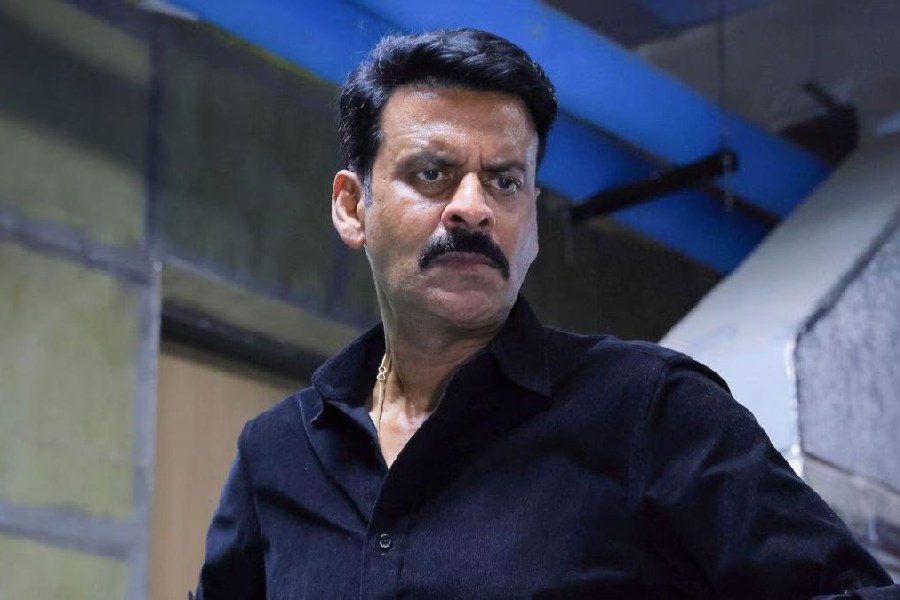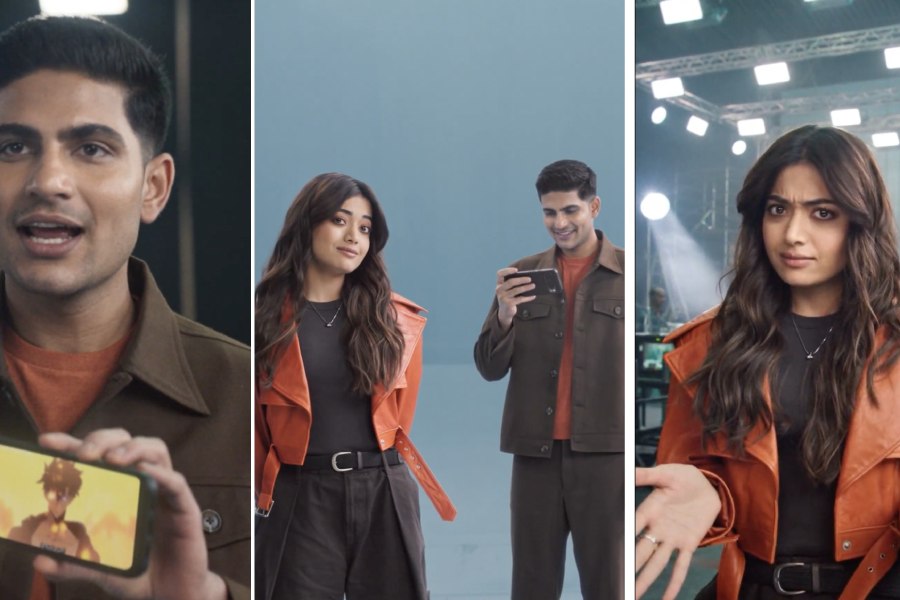 |
In selecting a headline for Maach Mishti & More, there is a problem of plenty. How about ‘Bitter Sweet Life’, a la Basuda’s (Basu Chatterjee) Khatta Meetha, one thought. For the film deals with various aspects of life — some sweet, some bitter.
Or, ‘Comedy is Back. Seriously’? For MM&M is very good comedy, with more than a touch of seriousness thrown in. Or, perhaps ‘Bong Connection: Remixed’? For there are traces of Bong Connection in it as well. Or, for that matter, ‘It’s a Kosher’, a Jewish-American expression that says, it’s bloody good.
But, one finally settled down to the ‘Coming of Age of a Director.’ For a movie is finally what the director makes of it. Success or failure, it’s he who has to take the final call.
 |
This is where Mainak (Bhaumik) as director excels. He has handled a complicated story, with a maze of plots and sub-plots, with a sure touch. He’s put flesh and blood to the characters wonderfully well, till you feel you are actually watching people as real as your next-door neighbour.
But what is even more remarkable, in the handling of the material, is that he has displayed a surprising degree of maturity, a gentle, almost indulgent understanding of the imperfections of human nature.
As a director, Mainak is a man of few words. (Read, none). But then, the camera and the celluloid language he has created does all the talking for him. In the process he has given us some wonderful cinematic moments in the film.
Cinema magic is not necessarily words. It can just be a wistful glance, or simply Soumitra’s (Chatterjee) looking up at the sky to suggest that life can be so wonderful. It’s there in the rat-tat-tat telephone call of Anubrata, desperately trying to convince a landlady to rent out a flat; in the careless tossing away of an ‘adult’ magazine from the prying eyes of a mother; in the delicious romp of Neha and Anubrata on a bike, streaking through the streets of Calcutta; in the deliberate burning out on the face of Soumitra to forebode impending death; in the clever juxtaposition of Swastika walking aimlessly through shopping arcades, while her husband is gallivanting away with his girlfriend (Pamela).
MM&M is mainly about relationships — marital relationships; extramarital relationships. Relationships inside bedrooms (more about it later) and outside. Relationships between an over-anxious mother and her sons. Between grandpa and grandsons. The special bonding between the three brothers. Girl and boy relationships. Boy and girl fumbling relationships. Girl-on-top relationships. You have it all. And Mainak has treated each of them with refreshing candour and boldness. Without a trace of vulgarity.
 |
Acting is uniformly impressive. Top-drawer performance from Soumitra in the role of the grandfather. Beneath his benign exterior lies an astute observant eye that misses nothing, be it Anubrata hitching a free ride on his girlfriend’s bike, or Shauvik making a hash of his marriage with a wonderful woman. And that one wistful, slightly mischievous look at the comely retreating figure of Parno is sheer brilliance.
Shauvik as the eldest grandson, just returned from the States, is his usual confident self, but perhaps a trifle too old for the job. Param enacts the role of an unsure, confused lover with practised ease. And Anubrata, as the cocksure, upstart youngest of the brood, is absolutely irrepressible.
Amongst the women, Swastika, post-Bhooter Bhobishyot, is in a different zone. She stops acting and becomes the character which makes her a dangerous customer. Raima’s acting is more cerebral, making the most of her wonderful expressive eyes, now revealing undiluted joy, now disguising unspeakable hurt, as her boyfriend is about to retreat to his former girlfriend. In the role of a tongue-tied, love-lost girl, Parno is good, her eyes doing a lot of talking, as in Dutta Vs Dutta.
One reserves Neha till the end, because she is the surprise package of the lot, untried and untested, but simply unstoppable as the ‘girl on the mobike’, specially in that soon-to-be-famous, classic reversal of the boy-lifts-the-girl-in-his-arms scene. And in that fleeting appearance as a director in the film-within-the-film sequence, lasting all of 95 seconds, Prasenjit (Biswas, associate director) blasts everything out of sight in a brilliant impersonation of a current director, making half the audience literally fall off their chairs. And how can one forget Ajopa (Mukherjee), Swastika’s real-life sister, acting as her reel-life sister in MM&M? Forget her being portly, she is an absolute peach.
Oh! Before I forget... Supriyo (Dutta) as the DoP is thoroughly professional, without being obtrusive. His close-ups are telling. Music: Neel Dutt, pleasing to the ears, especially the song on the title, sung by Rupankar, and the song for the bike sequence. Lyrics, provided by a galaxy of stars, is good but nothing to write home about. Perhaps, the visuals are so arresting that the lyrics have, perforce, to take backstage.
So we finally come back to Mainak. In MM&M, he’s marshalled all his resources, material and otherwise, so very well, and given us a film that is eminently watchable, with a lot of feel-good factor as a bonus. Do see it.
One last thought: This being the silly season of ‘evals’, sorry for the intrusion of the corporate slang (‘evals’ means your expected pay packet for the next year), it has been said Mainak can’t get away from the bedroom.
So very true. His bedroom scenes have an unmanufactured, raw candour that makes you think he’s been actually spying through key-holes. But he’s equally adept in dealing with relationship situations out of doors. Relationships, other than sex. As a matter of fact, MM&M is a mirror of much of today’s Bengali society, beauty spots as well as the ugly moles. And you need to doff your hat for that.
So maybe now some people will actually have to chew their own words. Amen.
What would you like to tell Mainak after watching Maach Mishti & More? Tell t2@abp.in











